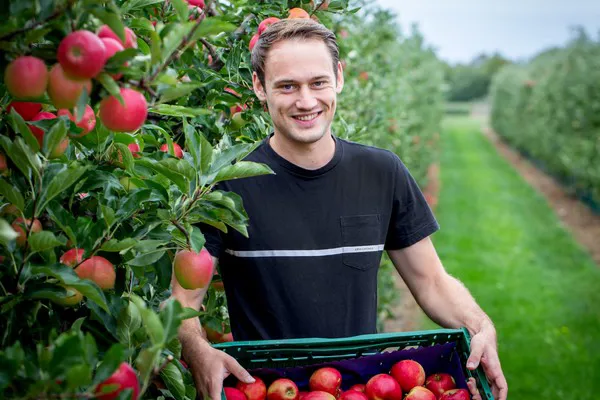While the harvest of late apple varieties is coming to an end, Landgard member farms in the West are generally positive about the 2023 apple season. "The quality is very good and the fruit is beautifully coloured, stable and therefore also easy to store. The cold spring delayed the blossoming, fertilisation and growth of the fruit somewhat, meaning that the season started around seven to ten days later than last year. However, the growing conditions for apples were generally good in the west this year and, apart from a few regional hailstorms in May, we were able to grow apples well. Apart from a few regional hailstorms in May, we have been largely spared capricious weather and persistent heat. Only Elstar yields in the west were slightly lower than in recent years due to alternance," says Arthur Heinze, Head of Fruit Sales at Landgard Obst & Gemüse GmbH & Co. KG, summarises the 2023 apple year.
Landgard members in the west grow apples on a total of 440 hectares, the core areas being the Meckenheim region and the Grafschaft area. According to the sales expert, apples from regional cultivation continue to be in high demand in the trade. Varieties with a high crunch content in particular are becoming increasingly popular. In order to be able to continue to reliably meet the demand for apples from Germany in the future, Landgard is working with its member companies to achieve a long-term, adequate price level that can absorb the increase in production costs in recent years.
 © Landgard eG Landgard producer Philip Wißkirchen
© Landgard eG Landgard producer Philip Wißkirchen
Increasing appreciation
Philip Wißkirchen from the pome fruit company K&P Wißkirchen GbR in Meckenheim also emphasises how important this is: "Unlike with other foodstuffs, the prices for apples did not rise last year - but our costs did, of course. This year, things have equalised somewhat. I'm pleased that our product is now being valued more again. Because what we produce here is much more than 'just an apple'. A lot of manual labour, passion and entrepreneurial risk goes into every single fruit."
Together with a 25-strong team, Philip Wißkirchen cultivates around 32 hectares of apples and four hectares of pears on his family's third-generation pome fruit farm. He deliberately favours a wide range of varieties and has gradually expanded the cultivation of Wellant, for example, in recent years. "What I particularly like about this variety is that it's not a standard apple," explains the fruit grower. "The Wellant is demanding to grow and also has a slightly lower yield than other varieties. But it rewards the extra work with a great flavour and very special aroma and is even suitable for many apple allergy sufferers."
Automation and irrigation
The Wißkirchen family has continuously invested in new technology in recent years to make production more climate-friendly and to protect the crops even better against extreme weather conditions. For example, hail protection has been improved and a modern, semi-automated sorting system with water drainage has been purchased. The cold stores are supplied with green electricity via photovoltaic systems and are to be converted to more environmentally friendly CO2 cooling in the near future.
Together with other fruit growers from the region, the family business has also built two large water reservoirs for reliable and resource-saving irrigation of the crops. "In the long term, this will pay off for all pome fruit cultivation here in the region. After all, what could be better for consumers than an apple from the region that is grown in an environmentally friendly and resource-conserving way, picked when ripe and sold quickly," says Philip Wißkirchen.
For more information:
www.landgard.de
www.obsthof-wisskirchen.de










